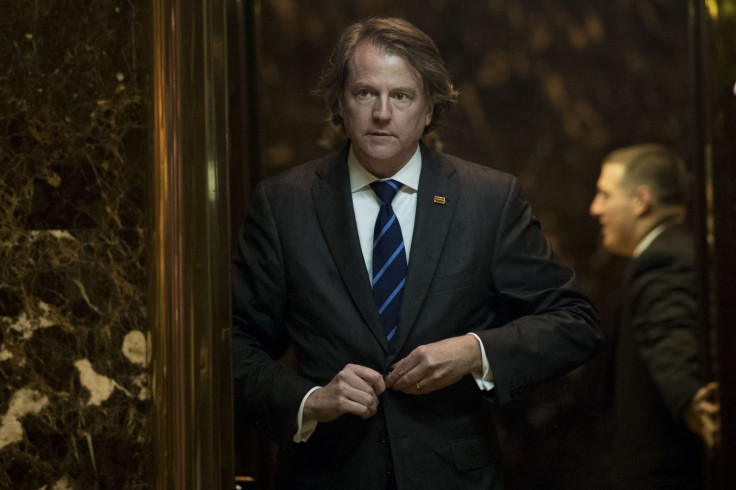Who Is Don McGahn? What To Know About The Former White House Counsel To Donald Trump

Former White House Counsel Donald F. McGahn II ignored a subpoena to appear before the House Judiciary Committee on Tuesday, making him the fourth Trump administration official in less than two weeks to do so.
But McGahn has been in the spotlight for several months, particularly after reports surfaced in January 2018 that he threatened to resign if he fulfilled an order to fire Special Counsel Robert Mueller.
McGahn served as Trump’s campaign counsel during the 2016 presidential election, and after the election was named General Counsel of the Presidential Transition Team. On Nov. 25, 2016, McGahn was named White House Counsel and served in that capacity until Oct. 17, 2018.
House Judiciary Cmte. holds "empty chair" hearing after President Trump directs his former White House counsel to defy a congressional subpoena and not testify before the committee. https://t.co/6N2eSi7iG7
— NBC News (@NBCNews) May 21, 2019
In August 2018, the New York Times reported McGahn had extensively cooperated with the special counsel’s investigation, and he and his lawyer had become concerned the president “had decided to let Mr. McGahn take the fall for decisions that could be construed as obstruction of justice, like the [former FBI Director James] Comey firing, by telling the special counsel that he was only following shoddy legal advice from Mr. McGahn.”
Earlier this month, the White House instructed McGahn to ignore a subpoena from the Judiciary Committee and to redirect records requests from the committee to the White House.
Attorney General Willam Barr ignored two subpoenas last week, from the Judiciary and House Intelligence committees, requesting an unredacted version of the Mueller Report. Treasury Secretary Steven Mnuchin refused a subpoena last week from the House Ways and Means Committee to deliver the president’s income tax records for the past six years, citing privacy concerns that conflict with a 1924 law authorizing Ways and Means to request and receive any and all income records of any person or elected official in the nation.
House Judiciary Chairman Jerrold Nadler on Monday sent McGahn a letter indicating the importance of his presence Tuesday before the committee.
The three-page letter dismissed responses from White House Counsel Pat Cipillone and the Department of Justice (DOJ) arguing Congress could not compel McGahn to testify.
“As Judge Bates previously explained, the notion that a former White House Counsel is ‘absolutely immune’ from a congressional subpoena has been ‘virtually foreclosed by the Supreme Court,’ which held several decades ago that senior White House aides do not enjoy such immunity even from civil damages suits,” the letter read.
JUST IN: In letter to McGahn, Nadler outlines legal theories he says require McGahn to testify tomorrow, even if he has to invoke executive privilege in person. Says committee is prepared to use “all enforcement mechanisms.” pic.twitter.com/C48VPnbhjV
— Kyle Cheney (@kyledcheney) May 21, 2019
An apt example is former White House Counsel John Dean, who was convicted of obstruction of justice in the lead-up to the resignation of former President Richard Nixon, after a variety of misdeeds, including supervising payments of “hush money” to operatives involved in the Watergate Hotel break-in of the Democratic National Headquarters. Dean requested Nixon grant him immunity from all crimes while in office and when the president refused, Dean cooperated with the investigation that led to Nixon’s resignation.
Nadler went on to call McGahn’s inaction “unprecedented,” and pointed out “the Justice Department’s own longstanding policy is that ‘executive privilege…should not be invoked to conceal evidence of wrongdoing or criminality on the part of executive officers.”
What is Don McGahn hiding? What is @realDonaldTrump hiding from the American people?
— Ted Lieu (@tedlieu) May 21, 2019
We will hold McGahn in contempt. We will litigate this in the courts. And we will win. pic.twitter.com/EZGR8OeO0q
McGahn, 50, received his Bachelor's degree from the University of Notre Dame and law degree from Widener University School of Law. He would go to work for a Washington, D.C.-based law firm, specializing in campaign finance law. Former President George W. Bush appointed him to the Federal Election Commission (FEC) in 2008, and is largely credited with the loosening of regulations governing campaign spending, according to the 2018 documentary “Dark Money.” The film delves into the influence and effects of corporate donations to the American political system, and how McGahn and two other new appointees formed a voting block to prevent enforcement of FEC regulations.
After resigning in 2013, McGahn moved on to two Washington law firms: Patton Boggs and Jones Day. He also was affiliated with Freedom Partners, an organization supported by the billionaire conservative Koch brothers.
When he arrived at the White House, he brought with him five attorneys from Jones Day and assisted in the appointment of six others to senior posts in the Trump Administration. Jones Day has represented Alfa-Bank, and represented a variety of business interests belonging to Russian oligarchs, including Oleg Deripaska, Viktor Vekselberg and Alexander Maskevich.
On May 7, the White House instructed McGahn to ignore a subpoena from the Judiciary Committee and refer inquiries directly to the White House. During an event at Cornell University shortly afterward, Speaker of the House Nancy Pelosi, D-Calif., called the plan an obstruction of justice, adding “Trump is goading us to impeach him,” according to Bloomberg.
© Copyright IBTimes 2025. All rights reserved.





















